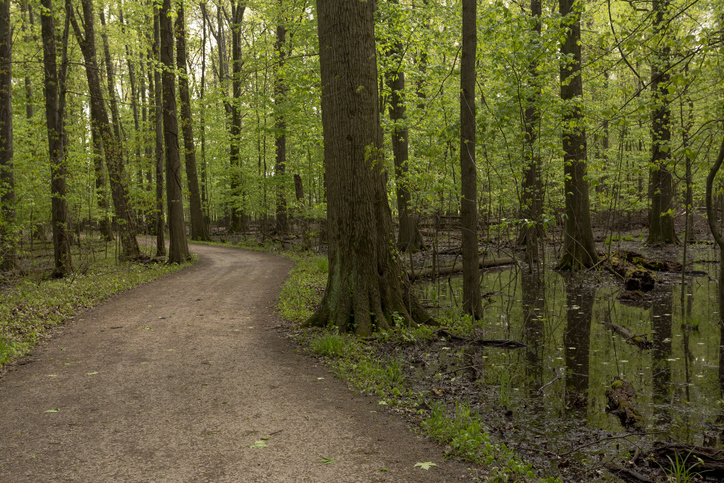Three Overlooked Factors Worsening the Climate Crisis
April 27, 2020
Another Earth Day, 50 years after the first, has just passed. Even if you weren’t around in 1970, you likely know the headlines of that time included a river on fire in Ohio, oil washing ashore from drilling off the coast of Santa Barbara, Calif., smog, and growing amounts of litter. These events resulted in a “teach-in” and, unexpectedly, some 20 million people showed up.
Politicians noticed, and soon passed laws to protect air, water, and endangered species and to address toxics and noise pollution. Equivalent actions were taken by states. Amtrak formed to preserve passenger rail. Lead in gasoline began to be phased out. The problem of acid rain and the ozone hole began to be addressed. Parks of all kinds, bike paths, and greenways were established. Recycling was expanded. Litter cleanups were organized.
But, five decades later, serious problems, perhaps more dire than ever, remain: the climate crisis, mass extinction, and vast social inequity.
There are multiple reasons for this, but I want to suggest three that are often ignored because they are difficult to address. But I feel we must if we are to make progress.
We lost the Republicans. When I came to Rhode Island in 1966, Republicans here were more the party of conservation. Republican John Chafee as governor and senator was one of several GOP environmental champions, and key bills of the 1970s passed almost unanimously.
For example, in 1973 the Endangered Species Act passed the House 380-12, the Senate 92-0. That is unimaginable today. President Nixon signed all those environmental bills, plus the National Environmental Policy Act bill requiring environmental analysis of major federal actions. Nixon also established the Environmental Protection Agency.
But that has all changed. Now, President Trump, in so many ways perhaps the most anti-environment president imaginable, is backed by almost all Republicans, both voters and those in Congress. The League of Conservation Voters has rated Democratic Senate Leader Charlies Schumer at 92 percent, the Republican leader Mitch McConnell at 7 percent, typical of their parties.
Republicans are also undermining environmental protection in many states — though to be fair, current Republican leaders in the Rhode Island General Assembly are decent and not so hostile. However, in general we can’t make and sustain environmental progress with such a hostile major party. I think we need to consider what went wrong and how to address it.
We’re losing to sprawl. Those in Rhode Island in 1970 may remember when “Apple Valley” had apples. There are similar stories of farms and woodlands turned into development all over the state, and country.
It’s understandable that many, including corporations, would prefer bucolic settings with easy parking and away from crowded cities. But the effect of this destroys wildlife habitat, increases resource consumption and transportation emissions, puts nature further out of reach of many children, and leaves many cities with inadequate resources, especially to serve vulnerable populations.
We have many policies that foster sprawl, such as prioritizing highway building that encourages long-distance driving — think the Interstate 295 interchange taxpayers built for Citizens Bank to move much of its workforce out of the metro area to the woods of western Johnston.
If we are serious about solving environmental problems, we have to think about how to take this on, even though it isn’t an easy issue.
We’re losing to population growth. In 1970, the world population was about 3.7 billion, now it’s 7.8 billion; the United States went from 205 million to 331 million. World population is still adding another billion people every 12 years.
Fifty years ago it was discussed and well understood that environmental impacts from such growth would spread into wildlife habitat, gobble up more and more of the planet’s resources, and increase deforestation and overfishing.
Population growth, however, is an awkward issue, because some areas are growing faster than others, and religious and ethnic sensitivities are involved. But millions and millions of women around the world, for reasons of poverty, lack of education, patriarchy, or religious zealotry, can’t access birth control. They deserve consideration.
It’s a mathematical truth that total environmental impact = the average impact per person, times the number of people. It’s an inconvenient truth, but like the climate crisis, it won’t go away because it’s inconvenient.
My take is environmental problems are serious, but they can be solved. However, it will take serious efforts and changes that will have to go far beyond feel-good measures or slogans.
Barry Schiller is a longtime Rhode Island resident.




Well said and I totally agree with your first two reasons. Thank you for remembering one of the bests of Republicans, John Chafee. We may be on the threshold of a fracture into two parties, one of Tea Party and the other of Lincoln/Chafee. I don’t believe we are losing to population growth. When times are tough, we re-examine the assumptions and adapt to changing circumstances. This is a natural process known as evolution, aka survival of a species, our species. Yes, there are two factors in the mathematical equation, average impact per person and population. In America there is little room for more birth control access. However, there are enormous opportunities in the average-impact-per-person department. With the sudden stop of commuting to work due to the corona-virus pandemic, our air quality has improved. Our dietary habits have become more conscientious and we have decreased the amounts of our waste. Americans throw out so much food that it amounts to enough calories to feed the eight hundred million starving people around the world. Europeans consume materials and energy at about half the rate of Americans. We are living high on the hog. In Europe you will not see a display of three hundred oranges just to motivate you to buy two. Yet, one could argue European quality of life is better than ours. The average-impact-per-person (GDP) equals quality-of-life equation is bogus (despite the money advertising pours into it). Rather than losing, consider population growth as gaining. The more brain cells upstairs, the smarter the person; the more people inhabiting Earth, the smarter the planet. Being more numerous, we no longer need reinvent wheels in every place. We share information, if not oranges, and adjust more easily to changing circumstances. This is evident in the lack of looting at this time of extraordinary unemployment numbers. Overall, you are correct. Our environmental problems are serious. Not only can they be solved. It’s a work in progress worthy of more than slogans and posturing. It begins with changing perspectives and taking just what you need.